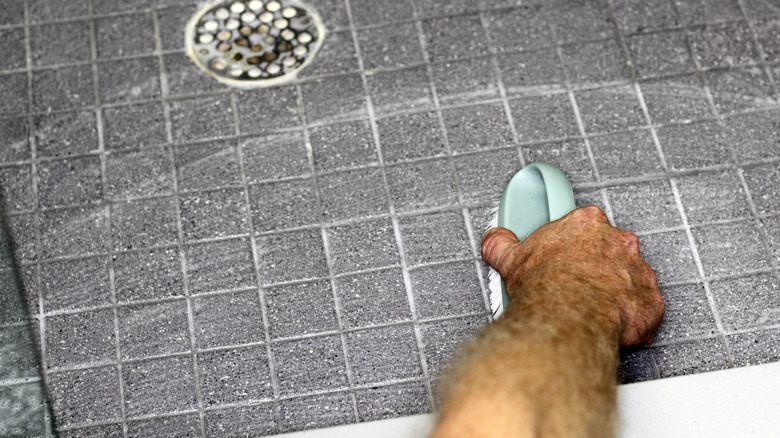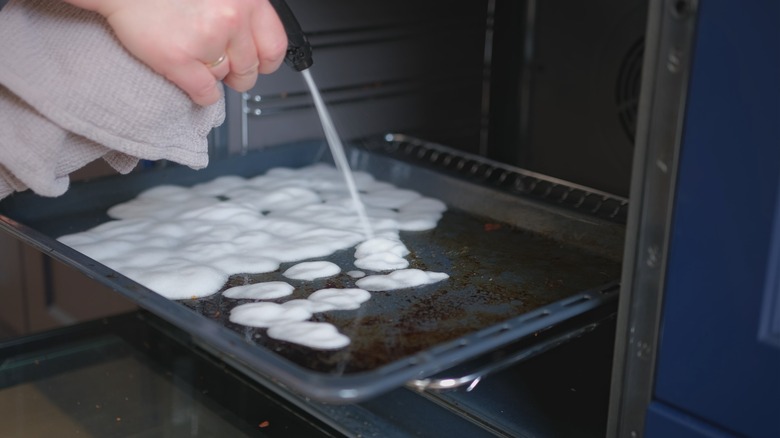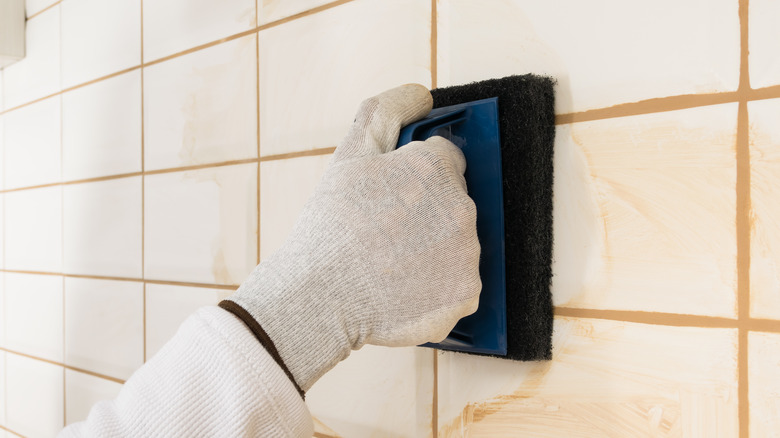Oven Cleaner: A Miracle Solution For Dirty Grout Or A Recipe For Disaster?
Whenever we see a new hack for getting super clean grout instantly, we are always suspicious. This is especially true when there are harsh chemicals involved and the product wasn't designed for this task. For example, a viral TikTok grout cleaner trend encouraged folks to pour Lysol toilet bowl cleaner onto their grout lines, which some users said destroyed their grout or surrounding marble tiles. But what about oven cleaner, a caustic solution that can eat through layers of grime? Many outlets say it removes dirt and discoloration beautifully. And as scrubbing grout lines can be one of the most labor-intensive cleaning tasks, a new shortcut is always welcome. However, as oven cleaner was designed to clean ovens and not tile grout, a little more research was necessary, which revealed that oven cleaner should not be used to clean grout.
Plenty of housekeeping blogs recommend using oven cleaner on grout, but very few include details about what precautions to take, and even fewer demonstrate its effectiveness. YouTuber @aroundthehousewithcheryl did use oven cleaner to tackle her kitchen floor tiles and said it's the only method they've found that really works. After watching the video, you can see a marked difference between the grout lines that had been scrubbed with oven cleaner and the ones that hadn't. The problem is, according to flooring and tile experts at Kowalski Granite & Quartz, that oven cleaner takes away more than just dirt and debris, as it can corrode the actual grout itself.
Why you should skip the oven cleaner
Grout is made up of three major elements: water, cement, and sand. All of these ingredients are porous and permeable materials, so cleaners won't just sit on the top. This might not be such a big deal for mild cleaners like baking soda and water (a mild alkaline solution), but it is when it comes to harsh products such as oven cleaners. The active agent in oven cleaners is usually a caustic solvent such as lye or soda ash, both of which are very powerful bases with a pH of 14 and 11.6, respectively. Even if you only leave the oven cleaner on for a few minutes before scrubbing and wiping it away, it could seep into the grout and eat away at it, causing it to crumble and fall apart. You may think you're just bleaching your grout lines or seeing dirt lift up, but more than likely, you're actually disintegrating the grout away. With repeated use, this can become a huge issue.
Not to mention, it's nearly impossible to limit where your foaming oven cleaner will spray. Ceramic tiles and non-porous materials may be just fine, but wood, natural stone like marble and granite, and concrete can easily become damaged if stray oven cleaner touches them. The consensus from Floorcare.com? Do not use oven cleaner on your grout. Instead, try cleaning grout with hydrogen peroxide, a solution specifically designed to clean grout, or good old steam.
If you decide to take the risk
If you are desperate to clean your grout and just need a fresh canvas between your non-porous tiles, you may still be tempted to try oven cleaner out. First, know that your grout will continue to slowly wear away with each and every use. Further, keep in mind that oven cleaners are much harsher than many other commercial cleaners because of their fumes and caustic chemicals, which means you want to take protective equipment seriously when handling it. Be sure to wear rubber gloves and a mask to prevent direct skin contact and inhaling the fumes. It's also important to have constant airflow in the room, so bring a fan in and open all the doors and windows. When you've finished scrubbing, you need to rinse the area completely several times. Residual oven cleaner can cause skin irritation and be harmful to pets, children, and anyone who comes into direct contact with it.
After the cleaning process is done, you should look for any damage to the grout. You may need to regrout over time if you notice significant gaps or corrosion. Regardless of whether or not you regrout, use a grout sealant afterward to rebuild the protective layer you may have wiped away and prevent future seemingly-uncleanable dirty grout lines. This will prevent dirt and grease from settling into the gaps of the grout and make it easier to clean the surface.


